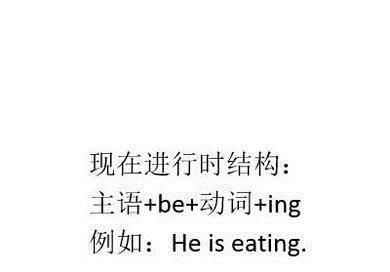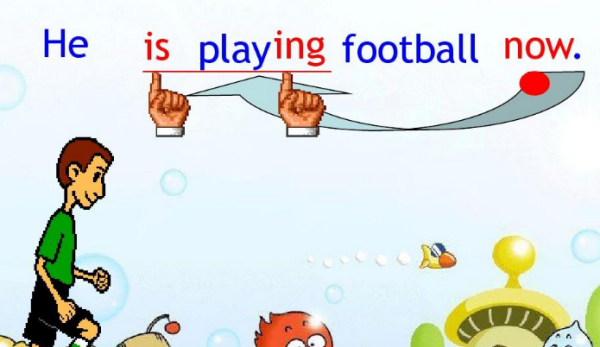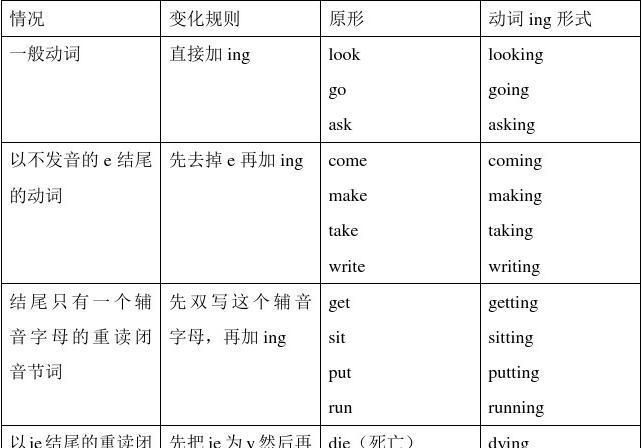本文目录
现在进行时的动词变化规则有哪些
7种
1、一般情况下直接加ing,speak---speaking,say---saying,carry---carrying 。
2、以不发音的字母e结尾的单词,去掉不发音的e再加ing,take---taking,leave---leaving,have---having 。
3、以重读闭音节结尾,呈现“辅,元,辅”结构的动词,先双写末尾的辅音字母,再加ing sit---sitting,run---running,forget---forgetting 。
4、以ie结尾的动词,把ie改为y,再加ing,die---dying,lie---lying。
5、以c结尾的动词,变c为ck,再加+ing, picnic---picnicking,traffic---trafficking。
6、以l结尾的动词,如果动词原形以非重读音节结尾,则末尾的字母l双写与不双写均可。其中不双写的是美式拼写,travel---travelling/traveling(U.S.)。
7、部分以-p结尾的动词同样遵循第6条,这类词多由“前缀+名词”构成, 如果动词原形以非重读音节结尾,则末尾的字母p双写与不双写均可。其中不双写的是美式拼写,worship---worshipping/worshiping(U.S.)。

扩展资料
现在进行时的基本用法
现在进行时的构成是:主语+be动词(am /is /are)+动词ing形式〔现在分词〕
1、肯定句:主语+be动词(am /is /are)+动词ing+其他。
2、 否定句:主语+be动词(am /is /are)+not+动词ing+其他。
3、一般疑问句:be动词+主语+动词ing+其他。
肯定回答:Yes,主语+ be.
否定回答:No,主语+ be not.
4、特殊疑问句:特殊疑问词+一般疑问句。回答要根据实际情况来回答。
参考资料来源:百度百科—现在进行时
现在进行时特殊用法(要全哦!)
现在进行时用法
1、现在(说话的瞬间)正在进行或发生的动作,强调“此时此刻”。E.g. He is reading. They are talking now.
2、当前一段时间内的活动或现阶段正在进行的动作。E.g. They are working these days.
3、某些动词的现在进行时,表预定的计划或即将发生的动作。E.g I am coming.
★其结构为be+现在分词. 现在分词的变法有:
1、一般在动词词尾加上-ing ,E.g. jump
2、以不发音字母e结尾的动词,先去e,再加-ing. E.g. have \ write
3、.以重读闭音节末尾只有一个辅音字母结尾的词,它前面是单个元音字母时要先将词尾的辅音字母双写,再加上-ing. E.g. sit put
★其句式变换都在be上做文章。
E.g. He is buying a bike.
Is he buying a bike?
He isn’t buying a bike.
★一般由look, listen, now, at this moment等时间状语做标志。
练习题
A. 基础篇
(一) 、单选
1、 Look! He _____their mother do the housework.
A. is helping B. are help C. is help D. is helpping
2、_____are the boys doing ? They are singing in the room.
A .Who B .How C.What D.Where
3、 Don’t talk here. My mother _____.
A. is sleeping B .are sleeping C. sleeping D .sleep
4、Danny ______. Don’t call him.
A. is writeing B .is writing C.writing D .writes
5、–When_____he_____back?
– Sorry, I don’t know.
A. does,come B.are coming C.is come D.is coming
(二)、填空
1、 It’s ten o’clock. My mother _____ (lie)in bed.
2、 What____he _____(mend) now?
3、 We _____(play) games now.
4、 What ____you____(do) these days?
5、 ____he ___(clean) the classroom?
6、 Who____(sing) in the next room?
7 、The girl____(like)wearing a sweater. Look! She ____ (wear)a red sweater today.
(三) 、写出下列动词的现在分词形式
1. work___________ sing__________ play__________ study________
2. dance__________ have__________ write__________ take______
3. run__________ sit__________ shop__________ swim________
4. lie__________
(四)、写出下列动词的第三人称单数形式
1. work__________ read__________ clean__________ write______
2. teach__________ wash__________ guess__________ watch_____
3.
go__________ do___________ photo__________
4. study__________ fly__________ cry__________ play________
5.have__________
B.中等篇
一将下列句子改成现在进行时
1. Tom speaks Chinese.
2. We have four lessons.
3. I watch TV every day.
4. She works in a hospital.
5. Do you like this book?
6. Kitty and Ben have lunch at about twelve.
7. His father can help them.
8. Danny, open the door.
9. They watch TV in the evening.
二. 按要求改写句子
1. The boy is playing basketball.
否定句:____________________________
一般疑问句:_________________________
肯定回答:__________________________
否定回答:__________________________
对“is playing basketball”提问:__________________________
对“ The boy”提问:__________________________
2. They are singing in the classroom.
否定句:____________________________
一般疑问句:_________________________
肯定回答:__________________________
否定回答:__________________________
对“are singing ”提问:__________________________
对“ in the classroom”提问:__________________________
3.仿照例句造句:
Model:read a book
--What are you doing?
--I'm reading a book.
1).read a new book________________
2).clean the blackboard________________
4.she,the window,open,now.(用现在进行时连词句.)_____________________
5.The birds are singing in the tree.(就划线部分提问)____________________
6.is,who,the window,cleaning?(连词成句)______________________
7.The children are playing games near the house.(就划线部分提问)
________________________
8.She is closing the door now.(改成否定句)______________________
9.You are doing your homework.(用"I"作主语改写子)___________________
10.they,the tree,sing,now,under.(用现在进行时连词成句.)________________
11.The Young Pioneers are helping the old woman.(改成一般疑问句)
______________________
三. 检测
1. What are you _________(do) now? I ___________(eat) bread.
2. It’s nine o’clock. My father_______________(work) in the office.
3. Look, the boy____________ (put) the rubbish into the bin.
4. __________he__________ (clean) the classroom? No, he isn’
He_________(play).
5. Where is Mark? He___________ (run) on the grass.
6. Listen, who____________ (sing) in the music room?
Oh, Mary_____________(sing) there.
C. 综合篇
一 选择题练习
1. Who _____ over there now?
A. singing B. are sing C. is singing D. sing
2. It’s eight o’clock. The students _____ an English class.
A. have B. having C. is having D. are having
3. Listen! The baby _____ in the next room.
A. crying B. cried C. is crying D. cries
4. Look! The twins _____ new sweaters.
A. are wearing B. wearing C. are wear D. is wearing
5. Don’t talk here. Grandparents _____.
A. is sleeping B. are sleeping C. sleeping D. sleep
6. Tom is a worker. He _____ in a factory. His sisters _____ in a hospital.
A. work/ work B. works/ work C. work/ works D. works/ is working
7. Who _____ English best in your class?
A. speak B. speaks C. speaking D. is speaking
8. Mrs. Read _____ the windows every day.
A. is cleaning B. clean C. cleans D. is cleaning
9. We _____ music and often _____ to music.
A. like/ listen B. likes/ listens C. like/ are listening D. are liking/ are listening
11. On Sunday he sometimes _____ his clothes and sometimes _____ some shopping.
A. wash/ do B. is washing/ is doing C. washes/ does D. is washing/ does
二、填空:
1. My father always __________ (come) back from work very late.
2. The teacher is busy. He __________ (sleep) six hours a day.
3. Listen! Joan __________ (sing) in the classroom. She often __________ (sing) there.
4. __________ your brother __________ (know) Japanese?
5. Where __________ you __________ (have) lunch every day?
6. The girl __________ (like) wearing a skirt. Look! She __________ (wear) a red skirt today.
三、根据中文意思完成句子
1、学生们在干什么?有一些在打电话,另一些躺在沙滩上。
_____ _____ the students _____? Some _____ _____ on the phone, _____ _____ _____ on the beach.
2、“格林先生在看电视吗?” “不, 他在打扫房间。”
“_____ Mr Green _____ TV?” “_____, He _____ _____ the house.”
3、魏芳不是在读书,她在写信。
Wei Fang _____ _____ a book. She _____ _____ a letter.
4、今天天气怎么样?_____ is the weather today? 或_____ is the weather _____ today?
5、我正在通过收音机学 (learn) 英语。
I _____ _____ English on the radio.
6、这个老人每天早上六点钟起床。
The old man _____ _____ at six o’clock in the morning every day.
7、你从哪里来? Where _____ you from? 或Where _____ you _____ from?
我从美国来。 I _____ from America. 或I _____ from America..
四. 综合选择填空。
( )1. Some are _________ in the river and some are _________ games.
A. swiming, playing B. swimming, plaiing
C. swimming, playing D. swimming, plaing
( )2. Look! The boy students are ___ football while the girls are ________.
A. playing, dance B. playing, dancing
C. play, dancing D. play, dance
( )3. He_____ to do his lessons at fight every evening
A. is beginning B. is beginning C. begin D. begins
( )4. ________ he _________ on well with his friends this term?
A. Dose, gets B. Dose, get C. is, getting D. Is, geting
( )5. Mr. Smith ______ short stories, but he ______ a TV play these days.
A. is writing, is writing B. is writing, writes
C. writes, is writing D. writes, writes
( ) 6. I _______ to the cinema. I _________ there every Sunday.
A. go. go B. am going, go C. go. am going D. am going, am going
( ) 7. Look. they _________ a good time, _________ they?
A. have, do B. have, don't C. are having, are D. are having, aren't
( ) 8. You ________about the future (将来) now, ________you?
A. don't think, don't B. aren't thinking, aren't
C. don't think, do D. aren't thinking, are

现在进行时动词变化规则
现在进行时动词的变化规则如下:
1、一般在动词末尾加ing。如:
read + ing →reading(读)
listen + ing →listening(听)

2、以不发音字母e结尾的动词,先去掉e,再加ing。如:
make →去e +ing →making(做)
write → 去e +ing →writing (写)
3、以重读闭音节结尾的动词,中间只有一个元音字母,词尾只有一个辅音字母,应双写末尾的辅音字母,再加ing。如:
run + n + ing →running(跑步)
swim + m + ing →swimming(游泳)
4、以ie结尾的动词,变ie为y,再加-ing 。如:
tie-→先将ie变为y + ing →tying(系)
die →先将ie变为y + ing →dying(死)
5、以l结尾的动词 如果动词原形以非重读音节结尾,则末尾的字母l双写与不双写均可。其中不双写的是美式拼写。
travel→travelling/traveling(U.S.)
扩展资料
现在进行时用场合:
1、当句中出现的表示时间的词是now,at the moment,;(此刻、现在)等时,表示句子要说明的是现在正在发生的事,动词应用现在进行时。例句:
Linda's brother is watching TV in his bedroom now.
现在,琳达的哥哥正在他的卧室里看电视。
2、当句中出现的时间状语是these days,this week,this month,this term 等时,如果句子所要表达的意义是在这一阶段正在发生的事,则动词应用现在进行时。例句:
These days we are helping the farmers work on the farm.
这些天我们在农场帮农民们干活。
3、在句中出现了Look,Listen,Can't you see? 等暗示词时,说明后面谓语动词的动作正在发生,该动词应用现在进行时。例句:
Look! Maria and Tom are dancing under the tree.
看!玛丽亚和汤姆正在树下跳舞。
英语一般现在时的知识点归纳
一般现在时就是am/is/are加名词。动词第一第二人称用原型第三人称加 S或es
现在进行时就是am/is/are加动词ing,有些动词要注意,有些要单词后面最后一个字母双写再加ing的,比如travelling,stopping,stepping等等
一般将来时就是will 加动词原形或者是谓语原形(am/is/are变成be)

以上就是关于现在进行时特殊变化单词 ,现在进行时的动词变化规则有哪些的全部内容,以及现在进行时特殊变化单词 的相关内容,希望能够帮到您。
